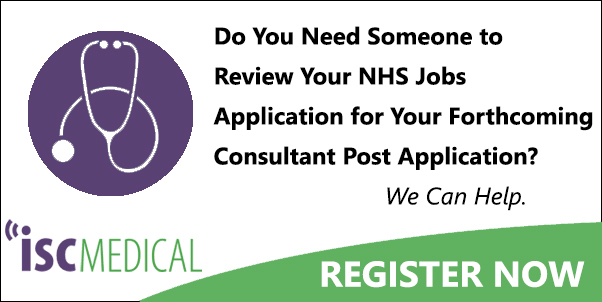The 5 Most Common Mistakes to Avoid When Completing Your NHS Jobs Application Form for Consultant Posts
When completing an NHS job application form for a Consultant post, there are a number of mistakes that applicants regularly make that damage their chances of being shortlisted.
Below we have listed out the most common mistakes you can avoid when completing your application form, in order to give yourself the best chance of being shortlisted.

1. Too much copying and pasting
Some parts of the application form can be repeated from one form to the next without having to worry about it. However, if you are applying for jobs which have different features, you may want to think twice about copying/pasting text straight up.
Two jobs which have a different clinical angle may require slightly different descriptions of your current duties so that you mainly focus on the aspects which are relevant for the post. Similarly, the examples you use in your leadership and team playing sections may differ depending on the type of role you will be required to work in your new post.
Make sure you understand what the job actually entails. Part of that information will come from the job description and the person specification. You may also wish to call the lead clinician for a pre-application chat, with the aim to gain information that will help you focus your answers in the form to the actual job you are applying for.
2. Laziness in the description of current duties
Most people reading your form will read only the descriptions for the current post and your most recent two previous posts. So, focus on those. In the description of duties and responsibilities, don’t just state the obvious. No one will give you much credit for saying that you attend MDTs, run clinics, and participate in teaching.
Use the space provided to provide more specific detail. Sell your clinical independence, set out your clinical experience relating to the areas you will cover in your new post, explain your proactivity in teaching, clinical governance, and service improvement/development, stating some of your most notable achievements. The reader must come out of reading your answer thinking “This person is kind of working at consultant level already”. Stating you attend MDTs simply won’t do it.
3. Lack of power words
Throughout the NHS Jobs Application Form you need to come across as this proactive person who oozes maturity, seniority and authority. It is therefore important that the image you project is of someone who can take charge and drive a team. As such, you need to use power words i.e. words which signal an intent and an active achievement.
For example: “I participated in a number of audits” does not give the feeling that you took charge or actually did anything of interest. Nor does “I attend MDTs on a regular basis”. Using power words would give something along the lines of: “I led and managed a team of juniors and nurses through 5 audits. Following two of those audits I revised and implemented revised guidelines on <topic 1> and <topic 2>, consolidated the junior doctors’ rota and organised a monthly departmental training session on <topic 3>.
Steer clear of phrases such as “I was involved in”, “I participated in”, “I enjoy”, “I have a passion for”. Instead, use words which explain your contribution
4. Too generic leadership/management and team playing sections
Most candidates give answers of the type: “I regularly lead a team in ward rounds, work well with colleagues, etc.”. Mundanities will not help you stand out from the crowd. You also need to give examples which are of a consultant seniority level, span the spectrum of activities a consultant would be expected to engage in (which means giving both clinical and non-clinical examples (non-clinical could mean in a managerial context) and explain what you actually do and contribute.
For example, ‘leading a ward round’ points to an activity but not to your contribution within that activity. The team playing within leading a ward round could be that, though you run those efficiently, you also allocate part of it to teaching medical students and junior doctors by engaging with them more. Similarly, ‘active involvement in teaching trainees’ is very vague, whilst setting up mock vivas for doctors taking their membership exams within your spare time shows a more proactive contribution. Give just two or three examples per question, but make sure you provide detail on what you actually contribute.
5. Sticking to broad headlines in the change management section
The change management section is difficult because the word count is restrictive. The section does mention that you can talk about an audit that you did, but in truth audits only have an impact if they actually led to a change. So, if you are tempted to simply list your audits, you can do so, but bear in mind other candidates may get the upper-hand by being more focussed on actual change.
When you describe the change, use power words again and proper verbs. Avoid using nouns e.g. “Implementation of new guideline”, or “New guideline”. You would get a stronger impact with “Wrote and implemented new guideline on xxx. Set up training session”.
When you describe the change, explain what led to it, what you actually implemented and try to quantify its impact on outcomes, safety or patient experience. Saying “This reduced DNAs by 15% and increased throughput of patients by 10%” is better than “Overall this led to service improvement. Similarly, saying that “patient feedback was generally positive” is weak; instead, saying “Patients felt that the lower waiting times and the more seamless process once seen made for a better experience”
We provide a review service with in-depth comments on all sections of the form. Turnaround time; max: 48 hours. Only £99.


